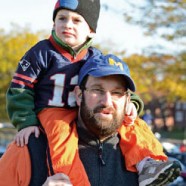
On Wednesday, November 16, our students contemplated the fate of “Todd” and “Amy”—the players in a courtroom drama that had unfolded during assembly. High school students don’t lightly sacrifice their recess period; yet, that morning, second period bled into the precious 15 minutes of free time, and no one even noticed.
That morning’s speaker, attorney Brett Sokolow, had appointed our students as the jury of a complicated, real-life case involving college students, alcohol, and a sexual encounter. Presenting the facts of the case, he charged the “jury” with deciding whether or not to find the defendant, “Todd,” guilty of sexual assault. After 50 minutes of fact sifting, thinking and weighing, the group was split down the middle—clear indication that these topics are complex.
What impressed me—even more than the students’ engagement in Mr. Sokolow’s presentation—were the myriad conversations I heard in the following weeks. In the hallways, in classrooms, at lunch, in the Student Center, people were talking.
My conversations with the Class I leaders of the Individual Student Support team, as well as those in my Class IV Health sections, were robust. They were heated, full of questions, answers, curiosity, need for clarification, more questions. Students are hungry for candid discussions of these topics.
The Samuel S. Talbot ’65 Memorial Fund was established to bring an array of professionals to Milton, educating our students about behavioral and mental health issues. Presenters have discussed body image, gender equity, eating disorders, sleep deprivation, self-mutilation, substance abuse, and the influence of the media. Every day, news headlines remind us that we must do all we can to bring these topics to light for young people.
As a counselor and psychologist, I am all too aware of the pressures high schoolers face. Being an adolescent is not easy, and today’s world presents more challenges than ever. Our culture bombards children with information at a dizzying rate. Helping them manage this information is our responsibility.
Milton’s affective education classes provide students with a forum and the guidance of a trusted adult—a venue in which to carry on a conversation, and a time dedicated to that task. Through outside speakers, affective education classes, Independent Student Support and SECS leaders, through Human Sexuality and Relationships classes and the availability of both adults and specially trained student peers, Milton makes clear that these topics are important.
Mr. Sokolow closed his presentation with a simple but powerful message: “I can not stop you from drinking alcohol or from engaging in sexual activity. What I hope to have done this morning is make you think, and make you aware of the potential consequences involved in taking these risks. Please take care of yourself, and take care of your friends.”
We cannot always stop our children from making poor choices, but we can—and must—provide them with the information necessary to make the right ones—or, if they’ve lapsed, to know where to turn for help. I’m grateful to be part of a school committed to arming students with the tools to make healthy choices, and supporting them as they navigate these years.
— Dr. Elihu Selter



